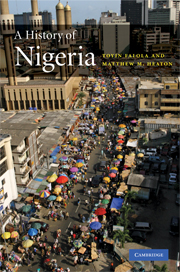Book contents
- Frontmatter
- Contents
- List of illustrations
- List of maps
- Acknowledgments
- Chronology
- Notable people in Nigerian history
- List of abbreviations
- Glossary
- Map 1 Major cities and ethnic groups in present-day Nigeria
- Introduction
- 1 Early states and societies, 9000 BCE – 1500 CE
- 2 Slavery, state, and society, c. 1500 – c. 1800
- 3 Political and economic transformations in the nineteenth century
- 4 Transition to British colonial rule, 1850 – 1903
- 5 Colonial society to 1929
- 6 Nationalist movements and independence, 1929 – 1960
- 7 Instability and civil war, 1960 – 1970
- 8 Oil, state, and society, 1970 – 1983
- 9 Civil society and democratic transition, 1984 – 2007
- 10 Nigeria and Nigerians in world history
- Concluding remarks: corruption, anti-corruption, and the 2007 elections
- Notes
- Selected bibliography
- Index
Introduction
Published online by Cambridge University Press: 05 June 2012
- Frontmatter
- Contents
- List of illustrations
- List of maps
- Acknowledgments
- Chronology
- Notable people in Nigerian history
- List of abbreviations
- Glossary
- Map 1 Major cities and ethnic groups in present-day Nigeria
- Introduction
- 1 Early states and societies, 9000 BCE – 1500 CE
- 2 Slavery, state, and society, c. 1500 – c. 1800
- 3 Political and economic transformations in the nineteenth century
- 4 Transition to British colonial rule, 1850 – 1903
- 5 Colonial society to 1929
- 6 Nationalist movements and independence, 1929 – 1960
- 7 Instability and civil war, 1960 – 1970
- 8 Oil, state, and society, 1970 – 1983
- 9 Civil society and democratic transition, 1984 – 2007
- 10 Nigeria and Nigerians in world history
- Concluding remarks: corruption, anti-corruption, and the 2007 elections
- Notes
- Selected bibliography
- Index
Summary
The aim of this book is to provide a general background survey of the broad themes of Nigeria's history, from the beginnings of human habitation in the region up to the early twenty-first century. The borders of modern-day Nigeria were established in 1914 by British colonizers, but the histories of the peoples that make up the Nigerian polity go back many centuries. Most general histories of Nigeria written since Nigeria gained independence from the United Kingdom in 1960 tend to focus almost exclusively on political and economic themes, and almost exclusively on the twentieth century. This book, on the other hand, aims to bring a greater chronological and thematic balance to the narrative of Nigerian history. Themes such as state formation, political institutions, commercial activities, and political economy are important, and are covered extensively in this book, but these themes featured in the history of the region well before the twentieth century, and, in many ways, events that occurred prior to the twentieth century are highly relevant to an understanding of Nigerian history in subsequent periods.
Politics and the economy are not the only barometers of history. This book also makes a special effort to illustrate social and cultural themes in Nigeria's history, such as the roles of ethnicity, religion, education, urbanization, and globalization, in the lives of Nigerian peoples and states over the centuries.
- Type
- Chapter
- Information
- A History of Nigeria , pp. 1 - 15Publisher: Cambridge University PressPrint publication year: 2008

